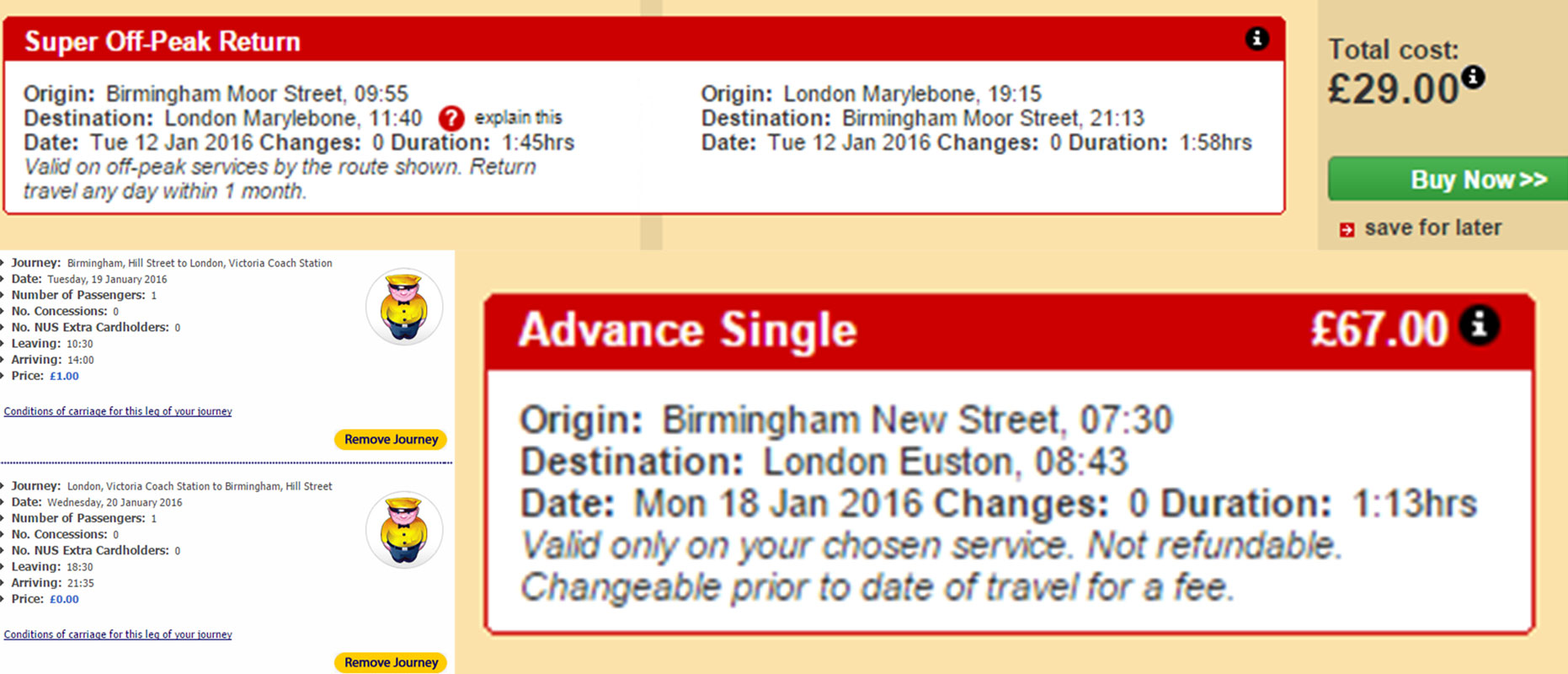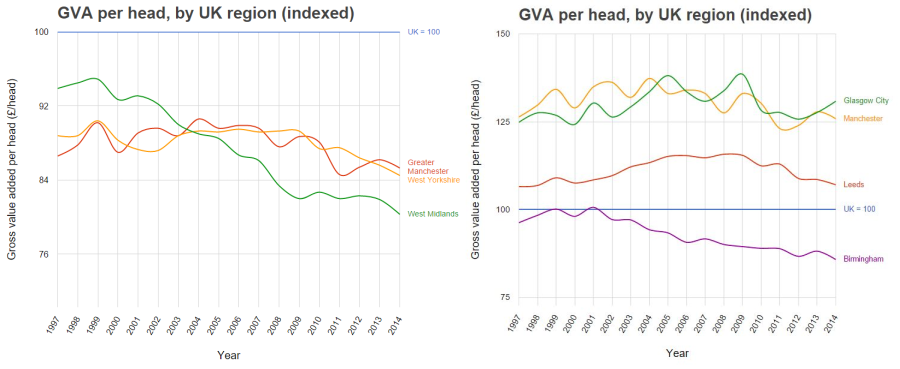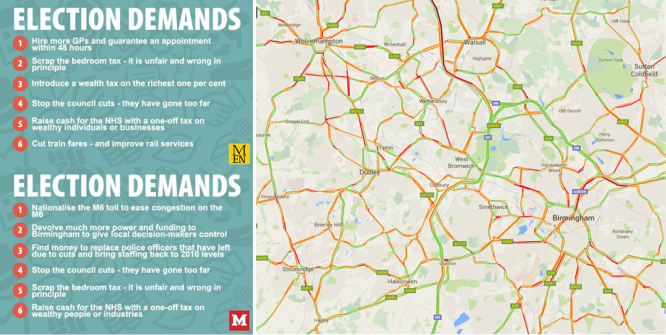
A year in Birmingham
February, 2016
If an economist designed a second city for the UK, they’d design Birmingham. Yet despite all of its advantages, and despite it being a great place to live, the city is an economic catastrophe. I moved here just over a year ago and I’ve got a few ideas why. I share them in the hope that Brummies and Britons alike will think again about how cities succeed.
Birmingham’s advantages
Birmingham is big. It is tied with Manchester as the UK’s second-largest city and it is significantly larger than the UK’s next largest cities, Leeds and Glasgow. There is lots of evidence that big cities generate more wealth per person than smaller cities. Birmingham should be rich.
Birmingham is well-placed and well-connected. Just 100 miles from London and 90 miles from Europe’s busiest airport at Heathrow. Two mainline railways and two motorways connect it to the capital. More railways and more motorways connect it to every part of the UK. A train at 7:30 gets you to London in time for a 9am meeting. Flexible tickets are as cheap as £29 return and the bus costs as little as 75p each way.

Birmingham’s city region has excellent universities. Both Birmingham and Warwick universities are ranked ahead of Manchester, Leeds, and Glasgow. Birmingham City University, Wolverhampton University, and lots more colleges provide extensive further and higher education.
Birmingham is diverse. Its economy has never been over-reliant on a single sector. Its population is young, ethnically diverse, and well connected to the world. These are all factors that many economists use to explain London’s success. They should work for Birmingham too.
Birmingham has fabulous assets and infrastructure. It is home to a major international airport, the national indoor arena, the national sea life centre, and the national exhibition centre. They’re all connected by motorway and rail to the whole country. Birmingham has two cross-city railways of the kind London has just spent £40bn emulating, capacious roads connecting every part of the city, and ample city-centre parking.
Birmingham’s recent performance
Despite these advantages Birmingham’s economy has fallen behind Manchester, Leeds, and Glasgow in the last 20 years.
Once well ahead, the West Midlands’ economy is now last place behind Greater Manchester, West Yorkshire (Leeds), and South Western Scotland (Glasgow). Extremely unusually, instead of being a wealth-generating hub, the central city of Birmingham has a weaker economy than its surroundings.

Money isn’t everything, but Birmingham’s failure to generate enough wealth has big impacts. Three of the ten most deprived constituencies in England are in Birmingham. Greater Manchester and West Yorkshire hold just one each. By some estimates half of Birmingham’s children live in poverty. And at a time of central government cuts and devolution the fact that the West Midlands generates only £20bn in tax revenues while receiving £30bn of public expenditure makes it harder to demand an end to austerity than if the city paid more of its own bill for vital services.
Why has Birmingham failed?
Birmingham should be the UK’s second most important city. Instead I’d say that it’s probably in sixth place. Since I moved here I’ve identified five big reasons why.
Ruined by cars, but everyone wants to drive.
Birmingham is proud of its history of mass car building, but that pride has gone to its head. The city is clogged with cars. Most pavements are parked on, double-yellow lines and speed limits are seemingly voluntary, and huge sections of the city are cut off from each other by massive roads.
What does Birmingham have to show for this? Traffic congestion that makes travelling around the city at peak times impossible and citizens who are scared to take to the streets. I have witnessed five car crashes since I moved here.
And yet despite this, Birmingham defends its right to drive and park where and how it likes to the death. In fact it wants more! When parking charges were proposed at my local park there was outrage. The usual campaigners for social justice turned a blind eye to the fact that the city’s poor who do not drive must pay to get the bus while they enjoy subsidised parking. If ever it was suggested that parking shouldn’t be free at the botanical gardens I imagine there would be riots.
To highlight how far behind its competitors this attitude puts Birmingham we only have to look at a campaign run by Trinity Mirror regionals before the last election. Manchester’s MEN and Birmingham’s Mail ran the same survey to understand what issues were most important to their readers. Mancunians wanted a better health service. Brummies thought that the right to drive on the M6 toll road for free was more important.

The centre of the UK, but only looking to London.
If a group of young lads “looks after your car” for you in Liverpool, they do it in a scouse accent. If a similar group in Manchester or Leeds are chatting while listening to happy hardcore on the back of a bus they do so in a suitably filthy Northern accent. One of the most jarring experiences for me in Birmingham is that the same genre of lads speak not like they’re fresh out of Peaky Blinders but more like they want to be Dizzee Rascal.
Looking to London is endemic in Birmingham. I’ve heard dozens of people talk about how great HS2 will be, because it connects to London. Not one has mentioned anywhere else in the country. Birmingham airport's big economic pitch is that it could relieve some of the congestion at Heathrow. Even Birmingham’s local trains are provided by a company called London Midland and no one seems to care.
Birmingham feels so desperate to be second city to London’s first that it forgets that it’s perfectly position at the centre of the UK and should be aiming for top spot.
Big and diverse, but desperate to be small and separate.
I get it, you think “Birmingham is a collection of villages”. It isn’t. There are no sheep or cows in Moseley, “The Village Inn” pub has a pay and display car-park, and there’s a bus to the city centre every 4 minutes. The only similarity that Moseley has with the real village that I grew up in is that it's too small a community to support amenities like a cinema, a bank, or a swimming pool.
The problem is that people in Birmingham really are very proud of their local areas. A proposal to change some ward boundaries in the city has led to outrage and public meetings far larger than when there was a reasonable suspicion that many schools were preaching radical Islam. And each area pretends that this is a positive. Local, friendly, community, warm, stuff. It isn’t. Birmingham is poor because it operates at too small a scale to generate the wealth it needs to educate its young and care for its old. Its communities seem almost proud of how little they interact with their neighbours and are unaware or unconcerned by the poverty this generates.
Empty, but worried about gentrification.
Birmingham is empty. More than Liverpool or Hull, and much more than Leeds and Manchester, it feels really empty. The central market is empty for two days a week, in parts three. Great city-centre pubs are empty even on the weekend. The city-centre empties out at around 7pm every day and stays that way until 8am.
Get a train into or out of Birmingham and you’ll see acre after acre of disused land. Where the warehouses and factories have been pulled down land is used as cheap car parks. Where they haven’t, empty shells await some form of redevelopment. The city-centre living boom that has regenerated Leeds and Manchester is beginning but is probably a decade behind those cities.
And yet there seems to be huge anxiety about gentrification. I’ve witnessed and dealt with this before when I lived in Leeds. One particularly amusing example was an attempt to oppose development under the guise of opposing gentrification even though no-one was being displaced.

This same spirit exists in Birmingham even where there is so much empty space the displacement that defines gentrification is impossible. I suspect that this phenomenon is a spill-over from the city’s close connections with London. Just as the chavs call me “bredrin’” to pretend they're from Brixton many other Brummies oppose gentrification for the same reason.
Absolutely poor, but focused on equality.
Birmingham’s memory as a city is of being wealthy. As recently as twenty years ago it was much better off than all of its competitors. Memories die hard.
As a result Birmingham seems to be fighting a war on inequality without appreciating that it is absolutely poor within the UK. High child poverty rates are met with calls to reduce inequality in the city as if the wealth to solve Birmingham’s problems already exists locally.
The stark truth is that Birmingham is now a poor city. The larger cause of the disadvantages that many of its residents face is not inequality but the result of the city as a whole not generating enough wealth to support them.
Why does this matter?
With the exception of London, the UK’s large cities significantly underperform their equivalents in Europe and America. Our nation’s overreliance on the capital is bad for all; from the wealthy person in London who cannot afford to buy a home to the poor person outside of London who cannot find a productive job.
Birmingham’s failure matters doubly because the UK’s current approach to regional economic growth is to make every city more like Birmingham.
Bigger
We’re encouraging our cities to become both denser and physically larger so that they benefit from agglomeration. But we’re failing to realise that without proper local transport our cities are separated from themselves even at their current size. Dudley may as well be in Wales for all it matters to Birmingham. That is why it’s so poor.
At peak time in most cities outside of London people cannot travel outside of a very small area. People in West Leeds to not mix with people in East Leeds. People in South Manchester do not mix with people in North Manchester. People in each of Birmingham’s “villages” barely mix. Our cities function as a collection of towns more than they do as true cities and there is currently no realistic plan to fix this in Birmingham.
Closer to London
We’re spending a huge amount of money on HS2 so that Northern English cities are as close to London as Birmingham is now. Given that exceptional that proximity has not made Birmingham wealthy we should be wary.
We would be far better off solving internal transport issues, as Manchester has done less poorly than elsewhere, than continually looking to London for help.
Connected via Heathrow
The main case for making Heathrow expansion a national project (and thus billable to national taxes) is that it will help the whole nation. And yet the UK city best connected to Heathrow has floundered.
Well, that’s it. 2000 words about Birmingham from someone who’s lived here for a year. I fully expect to be told that I’m a deeply bigoted moron who doesn’t understand anything about Birmingham and that I should fuck off. I don't want to do that. I really like it here, I think Birmingham's ace. I just think it could so easily be so much better.
So if I'm wrong, let's have a chat about it. Birmingham is going in the right direction, I just think it needs a kick up the arse.